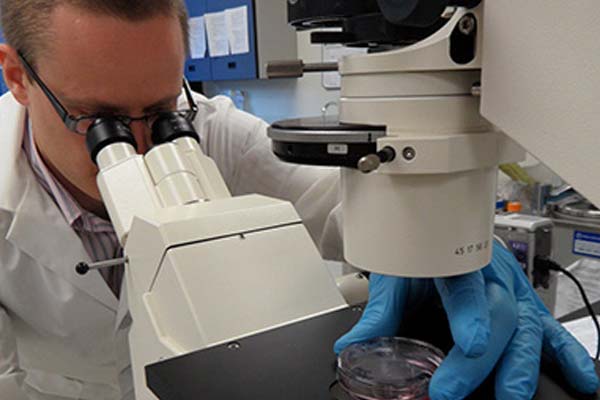
Umbilical cord cells outperform bone marrow cells
Published: November 21, 2012
When repairing damage from a heart attack, an injection of cells derived from human umbilical cord tissue is better than one of cells derived from bone marrow, University of Toronto researchers say.
Most stem cell therapies use cells harvested from bone marrow to stimulate tissue repair and control inflammation. But a new study published in Cell Transplantation found that, when injected directly into damaged heart tissue, cells originating from the tissues surrounding the blood vessels of the human umbilical cord are superior to those of marrow.
"We're hoping that this translates into fewer people developing complications of heart failure because their muscle function after a heart attack is better," said Dr. Armand Keating, Professor of Medicine, Director, Division of Hematology and Epstein Chair in Cell Therapy and Transplantation, cross-appointed to the Institute of Biomaterials and Biomedical Engineering (IBBME).
The study used standard heart function tests to measure the effect of the therapy after the cells were injected. Umbilical cord cells improved cardiac function by 40% compared with no treatment, while bone marrow cells improved function by only 18.3%. The umbilical cord cells were 120% more effective in improving heart function than bone marrow cells - a statistically significant difference, researchers said.
The results could represent a paradigm shift for stem cell research, researchers said, because the umbilical cord is a tissue typically discarded after birth.
Keating, director of the Cell Therapy Program at the Princess Margaret Cancer Centre and University Health Network (UHN), said he hopes to begin clinical trials of the HUCPVC cells on patients within the next 12 to 18 months.
He is also interested in conducting further research with the umbilical cord cells to overcome the damaging effects of chemotherapy on heart tissue, an agonizing problem for some patients who may be cured of their cancer only to confront heart failure as a result of treatment.
There are currently more than 250 clinical trials being conducted worldwide using stem cells to investigate the treatment of a variety of diseases, including a serious complication of bone marrow transplantation called graft-versus-host disease, autoimmune disorders, neurological diseases and tissue injury arising from lung and liver disease.
Tissue Regeneration Therapeutics (TRT), the Toronto-based company that created the technology platform for manufacturing the cells, provides cells to leading researchers around the world free of charge.
"We have a comprehensive family of international patents to protect this important cell source," says IBBME Professor J.E. Davies, and President of TRT.
A pioneer in this relatively new field, Davies filled his first patent, a special method of extracting this cell population, in 2003. Once isolated, the cell populations are grown to accommodate the research.

